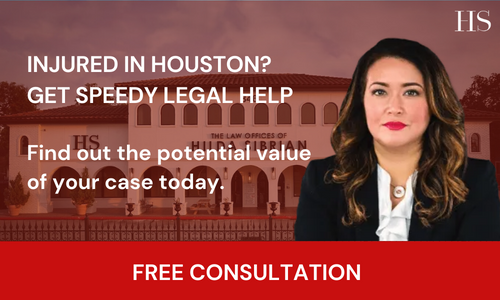Houston is a city known for dense traffic, constant congestion and stop-and-go driving. All of this adds up to a lot of impatient and frustrated drivers, and subsequent tailgating accidents. The majority of these accidents occur on the highway where traffic is slowest, or in downtown Houston during rush hour. This article will dive into the statistics of tailgating, including how often it happens and what to do if you’ve been hit by a tailgater.
How Many Tailgating Accidents Happen in Houston?
Tailgating, or “Following too closely,” is responsible for a significant number of accidents. According to the Texas Department of Transportation’s (TxDOT) Crash Records Information System (CRIS), Houston saw at least 436 tailgating related accidents in 2024. That means that there is at least 1 tailgating related accident in Houston every single day.
While many of these accidents are minor, they can (and do) result in serious injuries and even death in rare cases, as was the case in 2023, when a driver swerved into a median on Beltway 8 after being hit from behind.
Zooming out, we find TxDOT reported were over 558,000 traffic crashes statewide in 2023, resulting in more than 250,000 injuries and 4,291 deaths. TxDOT data shows that rear-end collisions are among the most frequent crash types – most of those are caused by drivers following too closely.
How Do Tailgating Accidents Happen?
Houston’s traffic patterns contribute heavily to tailgating behavior. If you have ever driven on US290 South, 59/69 West, or I-10 West during rush hour, you know that traffic can often draw to a standstill. This makes drivers angry, impatient, and aggressive. Some drivers get tired of being cut off so they draw closer to the car in front of them – others get annoyed at how slow traffic is moving and try to get the car in front of them to inch faster.
We’ve listed out some of the most common reasons below:
- Congestion on major freeways such as I-45, US-59, and the 610 Loop, where drivers impatiently or angrily close gaps in traffic.
- Distracted driving, especially from mobile phone use, which shortens reaction times and prevents drivers from noticing a slowing vehicle ahead.
- Aggressive or rushed driving, where motorists tailgate to pressure others to move faster or change lanes.
- Weather and visibility, as Houston’s frequent rain can reduce traction and increase stopping distances, making close following even more dangerous.
Under Texas Transportation Code §545.062, drivers are required to maintain a “clear distance” that allows them to stop safely without colliding with the vehicle in front. Like many traffic rules, however, this is more of a suggestion for Houston’s drivers.
Are Tailgating Accidents Even Dangerous?
Yes. While a tailgating crash during 10-mile-an-hour rush hour traffic will likely result in nothing more than a slight bump and a dented fender, higher-speed accidents can have serious repercussions, and even low-speed accidents can cause injury due to surrounding circumstances.
High Speed Tailgating Accidents
At higher speeds (60-80 mph) any small bump, especially to the rear of the vehicle, can cause the hit driver to lose control and spin out. And if that driver is also driving close, the accident can cause a chain reaction. Spinouts can sometimes result in rollovers, swerving into other traffic, and can lead to broken bones, burns, neck and spine injuries, for starters.
Tailgating is also not recommended because it can sometimes lead to retaliatory actions like brake-checking and other escalating behavior.
Low Speed Tailgating Accidents
Accidents at low speed can cause injuries to the affected driver’s neck, spine and lower back, even speeds as low as 10 miles per hour. Sometimes, this is because the affected driver’s air bag goes off – unlike the movies, air bags in real life can cause real damage to the driver. In addition, just being stopped in the middle of Houston’s highways is dangerous. Getting moving again to get the the shoulder after being hit can be hard if no one lets you over, and if the drivers choose to stay in the middle of the road they risk being hit by a distracted driver.
What Do I Do If I’m Hit by a Tailgater?
First, if you are being tailgated, and you think it’s intentional, do the following:
- Stay calm and avoid sudden braking. Abrupt movements increase the risk of collision.
- Move over safely. When possible, change lanes or allow the driver to pass.
- Increase your distance from the vehicle in front of you to create an extra buffer zone.
- Do not engage. Avoid brake-checking or gestures that could escalate the situation. Road rage is a significant reason for many accidents on Houston’s roadways.
If the tailgater continues to drive aggressively (following you between lanes, pulling in front of you to try brake-checking), note their vehicle description and location, and call 911 when you can.
Now, if you have been hit by someone that is tailgating you, assess the situation.
- Is anyone seriously hurt?
- Is my vehicle drivable?
- How heavy is the traffic?
- Was the person that hit me tailgating intentionally? Are they angry?
If anyone is seriously injured, your first step should be to call 911. If no one is seriously injured and your vehicle is drivable, however, do the following:
- Turn on your hazards and pull over to the nearest shoulder, parking lot, or side street. It is not recommended to get out during heavy traffic, especially on I-45, I-10 or the loop. Both TxDOT and the HPD have stressed that moving off the main lanes is not considered leaving the scene of the accident if you stay close to exchange information and speak to officers.
- Call law enforcement. Even for minor crashes, it’s best to get a police report. In Houston, you can either dial 911 if there are injuries or vehicle impairment, or the non-emergency line (713-884-3131).
- If the other party is angry, do not leave your vehicle. Except to exchange information, you do not have to speak with the other party until officers arrive. We recommend recording your conversation with the other party, especially if they are being aggressive.
- Visit a clinic or hospital. Most people still do not realize that small, low-speed accidents can lead to debilitating injuries. That small tightness in your neck might just be a slight muscle bruising – or it could be a compressed spine or whiplash. There really is no way to know unless you visit a physician.
What if I Was the One Tailgating?
Generally, insurance companies and the police assign all of the blame to tailgaters except in two circumstances:
- The tailgating was not intentional and could not be avoided
- The lead driver acted aggressively or performed some action to cause you to hit them (brake-checking).
Unfortunately, the only way that you will be able to prove you are not at fault is with the corroboration of multiple witnesses, or a dash-cam. If you were injured and believe you have a solid case, do not tell the insurance company that you were tailgating the other driver and call our office.
Contact an Experienced Tailgating Accident Attorney in Houston
Rear-end collisions can leave lasting physical and financial burdens. Medical bills, lost time from work, and long-term rehabilitation often follow what seemed like a minor crash. If you or a loved one was injured by a driver who was following too closely, The Law Offices of Hilda Sibrian can help.
Attorney Hilda Sibrian has represented thousands of Houston drivers and families affected by negligent driving. The Law Offices of Hilda Sibrian serve the entire Houston metropolitan area, including the cities of Bellaire, Clear Lake, Cleveland, Deer Park, Cypress, Pasadena and of course Houston proper.
Call 713-714-1414 today or contact us online for a free consultation.









